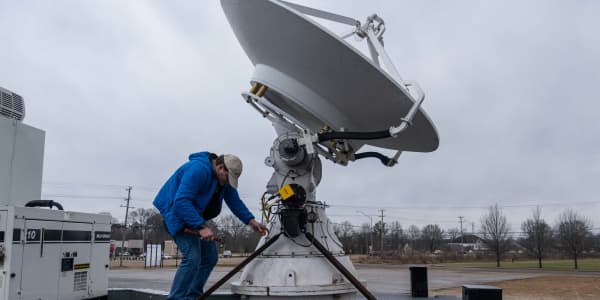


A tug-of-war between two states seeking to attract businesses has cost hundreds of millions of taxpayer dollars, with practically no net job gains on either side to show for it. And there's no signs of letting up, even as one of the states faces a wrenching budget crisis and businesses in both states say they don't really need the money.
For years critics of the war between all 50 states to attract companies — which CNBC highlights each year in our America's Top States for Business rankings — have pointed to the stalemate between the neighboring states of Kansas and Missouri as a prime example of the absurdity of it all.
Incentives in each state aimed at creating jobs allow companies to move employees from Kansas City, Missouri, to Kansas City, Kansas, and back again, each time collecting generous subsidies.
One study from the Hall Family Foundation found that in a five-year period, the two states gave up more than $200 million in tax revenues for a net gain of just 414 jobs for Kansas — at least until the next company shuffled some jobs back across the Missouri River. The study estimated that Kansas (No. 24 in the 2015 Top States ranking) had paid $340,000 per job.
Critics saw a small glimmer of hope in April when Kansas Gov. Sam Brownback, facing a $290 million budget shortfall, offered to cut some of his state's incentives if Missouri (No. 26 in the 2015 Top States ranking) would do the same. But the offer came with just weeks left in Missouri's legislative session. Facing no similar budget crisis in his state, Missouri Gov. Jay Nixon faced little pressure to go along. Besides, Missouri had already made its own offer to disarm in 2014, but at the time, Brownback rejected it. Missouri's offer expires in August.
Perhaps surprisingly, businesses in Greater Kansas City say they would just as soon see the incentives go away, even though in many cases they can, and do, collect tax breaks just by leasing some office space across the river and relocating some employees there.
In 2011, representatives of 17 area companies — including Sprint, Kansas City Southern, Great Plains Energy, Blue Cross Blue Shield of Kansas City, Quest Diagnostics and Hallmark Cards — signed an open letter to both governors urging them to halt the incentives and come up with a better way to promote the region as a whole.
"There are companies taking out short-term leases in hopes of taking advantage of the incentives more than once," the letter said. "This shuffle is a two-way street as one state lures businesses and the other responds in kind. Neither state will benefit as the stakes in this 'economic arms race' continue to escalate, and we squander available tax incentives by fighting amongst ourselves."
The Hall Family Foundation, which commissioned the study estimating the cost of the meager job gains, is the charitable arm of Hallmark Cards, which is headquartered in Kansas City, Missouri, but also has facilities across the border in Kansas.
"Nobody's saying we should dismantle these programs," Hallmark CEO Don Hall Jr. told CNBC. "But I think there's a growing need that we should try to agree to a strategy, a regional strategy that'll use these tools to attract business to this region that'll be more effective."
For now, though, there is no strategy, just a standoff that is costing both states millions.






